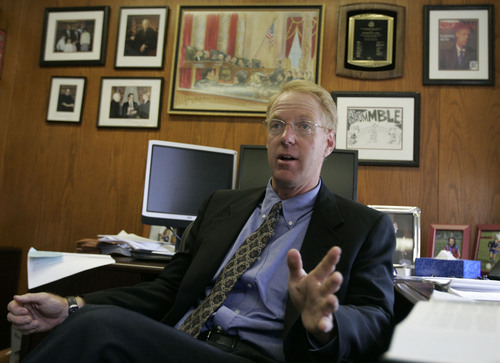This is an archived article that was published on sltrib.com in 2014, and information in the article may be outdated. It is provided only for personal research purposes and may not be reprinted.
Washington • The U.S. Supreme Court on Wednesday said a federal law limits how much money victims of child pornography can recover from people who viewed their images online, throwing out a nearly $3.4 million judgment in favor of a woman whose childhood rape has been widely seen on the Internet. Two dissenting justices called on Congress to change the law to benefit victims.
The case was argued before the high court in January by University of Utah law professor Paul Cassell, who is working with the woman's attorney.
The justices said in a 5-4 ruling that courts can order people convicted of child pornography to pay restitution to their victims, but only to the extent that there is a strong tie between the victim's losses and the convicts' actions. In this case, Doyle Randall Paroline, of Texas, was held liable by a federal appeals court for the entire amount of the woman's losses, though his computer contained just two images of her, among more than 150 illicit photographs.
The case involved a woman known in court papers by the pseudonym "Amy." Her losses have been pegged at nearly $3.4 million, based on the ongoing Internet trade and viewing of images of her being raped by her uncle when she was 8 and 9 years old.
When Amy was 17, she learned that pornographic images of her abuse, taken by her uncle, were being widely circulated on the Internet, which is where Paroline came across them.
Any's attorney, James Marsh, had filed a restitution request for $3.4 million — the sum first awarded to his client in a 2008 case under what turned out to be a little-used 1994 federal law that requires mandatory restitution for child pornography victims.
Since then, Marsh, who teamed up with Cassell about 4½ years ago, has filed restitution requests on behalf of Amy and other victims of child pornography in hundreds of cases. Amy has received victim notices in more than 1,800 federal child pornography cases. They have won restitution for Amy in 180 cases, collecting about 40 percent of the full amount awarded to her.
Marsh estimated in January that he, Cassell and other attorneys have filed more than 1,000 such requests on behalf of child pornography victims.
Cassell successfully argued last September in U.S. District Court for Utah that Michael Loren Dunn, of Park City, convicted of possession, receipt and distribution of child pornography, should be held liable for the full amount outstanding on a $1.3 million judgment in favor of a victim known as "Vicky."
In the Paroline case, Justice Anthony Kennedy said for the court that the appellate judges went too far when they said that Paroline was responsible for all of the woman's losses, without determining how much harm he caused her. Kennedy said federal judges have to figure out the right amount, but he provided only "rough guideposts for determining an amount that fits the offense."
The ruling steered a middle ground between the woman's call for full restitution and Paroline's claim that there was no relationship between his conduct and the woman's losses, so that there should be no award of restitution. The case turned on the interpretation of the federal law granting restitution to victims of sex crimes, including child pornography.
Justices Samuel Alito, Stephen Breyer, Ruth Bader Ginsburg and Elena Kagan joined Kennedy's opinion.
Chief Justice John Roberts, joined by Justices Antonin Scalia and Clarence Thomas, said the restitution law as written should mean that Amy gets nothing. In a separate dissent, Justice Sonia Sotomayor said she would have upheld the full award.
Both Roberts and Sotomayor said Congress can rewrite the law to make it clearer. The U.S. Sentencing Commission has recommended that lawmakers eliminate confusion among federal judges about the right way to calculate restitution. "The statute as written allows no recovery; we ought to say so, and give Congress a chance to fix it," Roberts said.
Advocates for child pornography victims argued that holding defendants liable for the entire amount of losses better reflects the ongoing harm that victims suffer each time someone views the images online. The threat of a large financial judgment, coupled with a prison term, also might deter some people from looking at the images in the first place, the advocates said.
Had the woman prevailed at the Supreme Court, courts would not have had to determine exactly how much harm any one defendant caused her. Instead, all defendants would be liable for the entire outstanding amount, raising the possibility that a few well-heeled people among those convicted might contribute most, if not all, of the remaining restitution.
The victim has so far received more than $1.75 million from people convicted of possessing pornographic images of her, her lawyers told the court. Of that total, $1.2 million came from one man, Arthur Staples, a Virginia sheriff's deputy who had more than $2 million in retirement savings.
The money is intended to cover the cost of her psychological care, lost income and attorneys' fees.
The case is Paroline v. Amy Unknown and U.S., 12-8561.
— The Salt Lake Tribune contributed to this story



